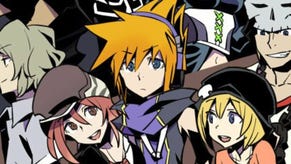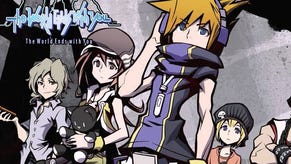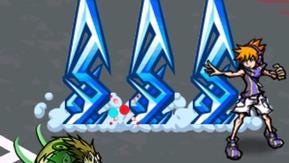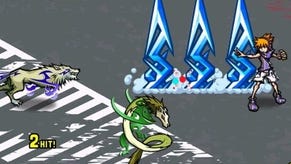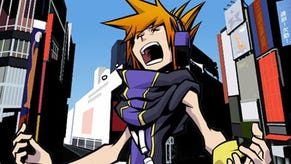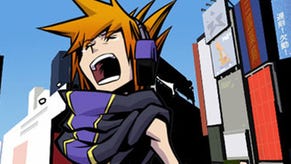The World Ends With You
Teenage clicks.
Neku's attacks are dictated by the pins he wears - all of which level up with use - and activated by carrying out the appropriate stylus taps, sweeps and scribbles. His partner, on the other hand, must navigate timed combos to the left or right depending on where they want to strike. Success on one screen sends a green "light puck" to the other character, where it can be increased and rallied back by yet more successful combat. In this way, increasingly powerful attacks can be built up.
There's no easier way of explaining this bewildering system, other than to say watch a video, but suffice to say the effect is much like patting your head and rubbing your stomach at the same time. And only having 30 seconds to get it exactly right, or you'll die. Yes, the game is hard, with a learning curve that initially has more of the vertical about it. While most RPGs warm you up with fights against rats or gooey blobs, The World Ends With You ramps up the difficulty almost immediately and, coupled with the unique combat system, the result can be exhilarating but also deeply frustrating.
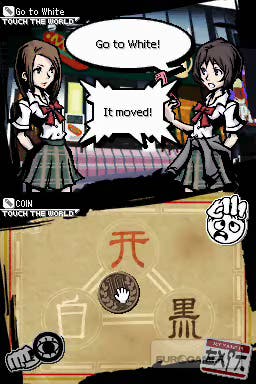
There are ways to offset this rude awakening though. You can automate the top screen (though this means you'll be unable to fully explore the combo system) and later on you're able to restart the battles at an easier setting. Neither completely compensates for the harsh pace, however, and if the game has one major flaw it's that it doesn't do enough to ease you in. Much like those Magic Eye pictures, I suspect there'll be a significant number of players who will simply be unable to get the knack and walk away muttering about hype. While that attitude won't get you anywhere, young man, the game itself must take some of the blame. The punishing process of grappling with so many new elements at once teeters on the tightrope between addicting challenge and off-putting chore.
And that's a shame, since the longer you play, the more the game reveals. It's no exaggeration to say that this may be the deepest game on the DS. Take Neku's pins, for instance. There are 300 to be found, all of them able to be levelled up, moved around into different configurations or assigned to sub-slots for additional combat options. Each of Neku's partners throughout the game can earn stars by completing card-based combos during combat. At every turn, there's a fresh idea, itself built on a foundation of yet more fresh ideas.
For instance, Neku's psychic powers also enable you to immediately see what all the milling NPC characters are thinking about, with their thought balloons opening up yet more info when clicked. Sometimes you get vital clues to your current task, most of the time it'll just be a glimpse into their personality. The comments can get samey, but as an alternative to walking around, clicking on each person in turn, it's quite brilliant. But that's not enough. No, the game goes deeper still, and as you grow more adept at using your powers, you're later able to pick up memes from one person and then transplant those thoughts into others. Not only does it work as a clever gameplay mechanic for delivering and solving puzzles; it's even a sly commentary on modern society.


